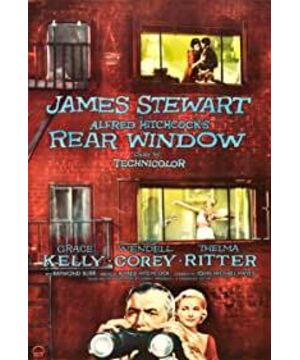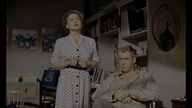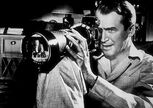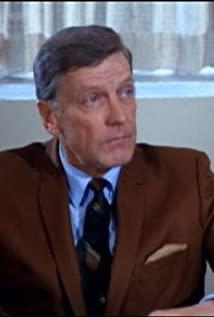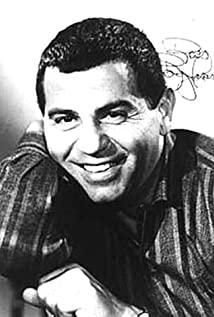Hitchcock is one of the film artists with the most cinematic sense. He has always advocated "pure film", that is, to demonstrate the plot completely by film means instead of telling the story through dialogue or narration. This film reflects his film consciousness from beginning to end.
At the beginning of the film, the curtains of Jeff's house are raised, and the windows of the buildings around the courtyard have a panoramic view. The camera slowly pans the windows of each house. After taking a few close-ups of windows with people moving, it sways back to Jeff's house, where he is lying. Sleep in a wheelchair. Then the camera pans to Jeff's leg, his left leg is put in a cast, and it says "Jeffries" on it. The lens continued to pan towards the broken camera on the side table and several enlarged photos on the back wall. The first one was the wheel of a racing car coming off and the camera flew towards the front. The others were mostly car accidents, wars and other thrilling scenes. . The camera finally pans to a negative of a close-up photo of a woman's head and a stack of magazines next to it. The cover of the magazine is the young girl's fashion photo printed on this negative.
This movement of the camera at the beginning of the film explains a lot of problems without a word. First of all, it shows the entire visual space of the film, and all the shots of the film have never been out of this range. The following close-ups selected a few people who are related to the plot to give a brief introduction. The panning after entering Jeff’s house even more delineated the image of the protagonist: He is a photojournalist, his camera and left leg were smashed by the wheels of a racing car, and he can only move around in a wheelchair; he loves adventure and specializes in taking photos with excitement. Sexual shots, even at his own expense; he has a close relationship with a fashion model. Hitchcock explained this intuitively in just two or three minutes, completely relying on the screen, which paved the way for the future development of the plot. Jeff's movement was restricted due to a leg injury, so he could only sit and watch the movement outside the window. The panning part of the window actually represented his entire field of vision. With this limited space and monotonous vision, Hitchcock can firmly grasp the hearts of the audience. Here, Hitchcock showed his extraordinary talents in directing.
Jeff's profession and his adventurous personality provided the initial motivation for the plot. As a reporter, he is very curious and likes to ask questions. He is active and unable to move, so he has to peek into the privacy of his neighbors to satisfy his curiosity and kill time, ignoring that it is a crime to infringe on the privacy of others. Watching neighborhood life through a window frame is like capturing meaningful shots through a camera viewfinder. Such peeking has become an externalization of his psychological desire to overcome a leg injury and continue his career. His adventurous personality also led to entanglements with Lisa. Lisa's world only has gorgeous fashion and warm love, which is obviously very different from Jeff's hobby. She can only become a burden to Jeff, and a threat to his freedom of movement. Jeff does not want to be a cocoon, he wants to get rid of her.
Hitchcock has repeatedly alluded to this conflict with the composition of the picture. For example, when Lisa was dressed luxuriously and elegantly when she debuted, Jeff glanced at her as if sleepy, and then closed his eyes. She approached Jeff, a thick shadow on his face. She kissed him tenderly, but he knowingly asked: "Who are you?" Lisa turned on the light while reporting her name. After the light turned on, she showed her shawl in an elegant turning motion. This set of shots not only explained her identity, but also hinted at the shadow of her relationship with Jeff.
Jeff saw scenes of life dramas from the windows of the neighborhood. These life dramas were all related to love and marriage. Hitchcock often looked at them and Jeff's troubles when showing them. For example, when Jeff explained to a friend on the phone that he did not want to get married, he happened to see Soward serving the sick wife, and the sick wife said something that prompted her husband to throw her hand, so he said why bother to get a woman talking in his ear . After talking about the marriage, he felt an itchy wound, and quickly grabbed the old man Le and stretched it into the plaster to scratch it. Lisa brought Jeff wine and delicacies, but what he saw was the lonely Miss Fangxin serving her imaginary boyfriend. He also saw the sick wife getting out of bed to intervene in her husband's phone call. The two women were both successful at this time. A variant of Lisa. Although Jeff did not clearly realize this, it will definitely work in his subconscious.
Hitchcock's structured plot like this is indeed ingenious. After the murder of his wife, when Lisa bravely climbed into Thorward's house to search for the ring, her adventurous spirit immediately changed his view of her. She proved that she was not a burden, but his indispensable right-hand man. The combination of the two immediately had a foundation, so when she shook the ring to Jeff, it had a double meaning. Jeff used to be always happy when he kissed Lisa before. Only then did he get really excited. There was anxiety, guilt in this passion, and love that was strengthened by her brave actions.
At the end of the film, Hitchcock used panning and coded visual language again: Jeff slept soundly with his back to the window, both legs were put in plaster, Lisa leaned on the bed to watch commercials. If you decode it, it means that Jeff has been punished for prying (breaking his legs), he is no longer interested in other people's nostalgia (sleeping with his back to the window), he should think about his own business-Lisa will Become his partner (leaning on the bed to guard him). Lisa also changed at this time. She put on casual clothes and read advertisements for bargains, which showed that she was really thinking about living at home.
The life in each apartment that Jeff saw through the rear window constitutes a miniature world. This small world is actually a microcosm of the big world outside. Since it is at home, there is no need to disguise and cover up, and people's desires and weaknesses are all exposed here. The newly married couple of young people indulge themselves all day long; the single composer can only use wine to soothe their sorrows; the lonely Miss Fangxin once had a lover, but it was just a beast in clothing, which made her almost despair of life, beautiful music and Aroused her yearning for life; the ballet girl had three men at the family banquet, but she was in love with her, waiting for her lover who returned from the army; couples without children had to move to pets. Thorward's family tragedy also has universal significance: the spouse who has been ill for a long time, the husband and wife who complained about each other.
Although Thorward killing his wife and destroying the body is cruel, it is also an aspect of real life. Soward is also an ordinary person. When ordinary people encounter troubles in their daily lives, many people will be like him in their minds, although it is rare to see them in action. These short stories developed in parallel with the protagonist's story, and one of them even violently collided with the protagonist, giving him a profound lesson. When the protagonist's stories are settled, these stories also come to an end (of course, comedies mostly end, because Americans like happy endings). Hitchcock condensed the various aspects of life in the courtyard, giving it multiple meanings, which are worthy of our careful taste.
The implications of Hitchcock's films are very rich, and there are often complex rational structures under the surface thrilling stories. One of the most distinctive features of this film is the discussion of the issue of voyeurism. Jeff's nature is restless, and his freedom of action was taken away after his leg was injured. His strong desire for adventure and curiosity was suppressed, he became abnormal, and formed a peeping impulse. The desires that cause voyeurism are varied, and the degree of aberration and harm are also quite different. Jeff's voyeuristic desire is only a continuation of his adventurous spirit, not a freak conceived by a certain possessive desire (such as possession or the opposite sex). It has not gone out of the ordinary and will not harm society. On the contrary, as a person with basically sound morals, his slight deviant behavior helped him to detect a murder that endangered society. Nevertheless, peeping is against the law and morality after all, and Jeff’s behavior must be punished (the right leg is also covered with a plaster), which constitutes the cure that the moralist Hitchcock has always shown in his works. Sexual theme: someone indulges in a certain abnormal state, eats the bitter fruit, and finally heals a certain weakness of oneself.
If Jeff's excitement-seeking and adventurous personality is regarded as his masculine characteristic, then, in psychoanalytic terms, he faces double punishment. First of all, hurting the leg is a kind of punishment, and because of this, he loses the active control of external affairs, so he has to peek and subjectively explain what he sees to satisfy his desire for control. This kind of dominance should be separated from the development process of the things being peeped (that is, dominance can only exist in the imagination), which is a prerequisite for safe peeping. However, anyone who has never lost his moral sense will not let his wife killer escape, so he violated the rules of the prying game. Not only did he get involved, but he also pulled Lisa into it. As a result, he attracted the most feared peepers. The incident—the peeper came knocking on the door, and this incident was aggravated by Jeff’s second punishment—injury to his leg. The second symbolic punishment for Jeff comes from marriage. Marriage means that he will lose his freedom and bear the burden of supporting the family, so he strives to get rid of Lisa and get rid of the bondage of marriage. This anti-natural sense of punishment was corrected at the end (this also became another layer of relief for Jeff). It should also be pointed out that “men conceal anxiety because of the existence of women”, which has become a common theme in Hitchcock's works. This film also more or less reflects his male-centered thinking.
However, as Hitchcock's famous masterpiece, the most thought-provoking thing about this film is its reflection on the film's own form. An outstanding feature of Hitchcock's sense of cinema is that he not only realizes it himself, but also makes the audience feel the existence of the film itself through the film. In this film, he starts from his own theory of film nature and simulates the expression of film methods everywhere, so that the attentive audience can appreciate and think. Jeff has a strong desire for voyeurism, and the psychological mechanism of audience watching movies is also voyeurism. Jeff sits in a wheelchair and looks at the outside world through the window (the whole film is from Jeff's point of view when showing the scene outside the window, with one exception, that is, when Jeff is thrown out of the window), and the audience sits in the theater and passes the screen Seeing the illusion of the world, the audience is also deprived of freedom of movement like Jeff, and cannot interfere in the course of the event. Jeff often peers at night and sleeps during the day, and the audience seems to be daydreaming in the dark.
At the beginning of the film, the blinds are slowly pulled up, which symbolizes the opening of the curtain in front of the screen. It seems that a different type of "silent film" is being staged in the windows of each house in the opposite apartment. There are several windows in a house, and the movement of characters is like switching between movie scenes. In the window, there are dancers' exercises and musicians' performances. This metaphors that they are all performing, just like actors in movies. The people on the other side can't see Jeff, just like a movie actor can't see the audience. Jeff sometimes imitates the audience and sometimes looks like the incarnation of the director. He edited and explained some silent fragments of life he saw in the opposite building, and sometimes supplemented the unseen plots with dialogue based on his own reasoning. Finally make up a complete story, and then make other audiences (Lisa and Stella) believe it. When he needed to see the details of the picture, he took out the camera and telescope lens, which not only accorded with his profession, but also symbolized the close-up shot of the movie.
There are several times in the film that the camera pans the window of the opposite apartment, and it always shakes back to Jeff at the end. This makes the audience realize that Jeff is not the same as a camera. There is a hand behind the camera that really controls everything-the director. The audience sometimes needs to identify with Jeff, and sometimes they need to be separated from him in order to have an objective understanding of him. Jeff watches "movies" in movies. Not only is he a viewer and editor of that "movie," he also insists on running in to play a role when he sees the key points. This is not only a kind of irony to the viewing mechanism, but also a kind of rescue for the audience. The reality of the people in the film and the reality of the audience are not at the same level, and it is impossible for the audience to interfere with the plot. However, after the audience agrees with the person in the film, they often want to replace the role in their hearts, just like Jeff wants to detect the murder of his wife and get involved. Jeff and his real-time "movie" are in the same reality, which is qualitatively different from real movies. Hitchcock uses this cleverly to enlighten the audience.
Jeff's experience is not only a transcendence of the audience's viewing experience, but also an externalization of the audience's psychology of viewing the movie. Jeff's punishment will serve as a warning to the audience. The wife-killer finally saw Jeff and broke into his room and threw him out of the window. This is the climax and highlight of the whole film, which is given multiple meanings. In addition to the above-mentioned metaphorical accidents, as far as the reflective nature of the film is concerned, it also shows the dislocation of the identity and space of "viewing" and "acting". The wife-killer broke into the room, Jeff was thrown out the window, the two identities were exchanged, and the play focused on Jeff outside the window. At this time, the camera's point of view also moved out of the room for the first time with Jeff, and pointed it at the window of Jeff's house from the outside several times. At this time, the "screen" and "audience seats" switched positions again. This is really out of order at the climax of the play. When the dust finally settled, the unbalanced world stabilized again, and the disrupted order returned to normal. It's just that Jeff has lost another good leg, and another lesson. Another point worth mentioning in the climax scene is that when the wife-killer hits the door, all that Jeff relies on for self-defense is the flash. This is another prop that conforms to his profession and can be used as a metaphor for the movie. The flash can't stop the murderer, suggesting that the movie is just a means of bluffing and can't solve real problems in the slightest.
View more about Rear Window reviews


